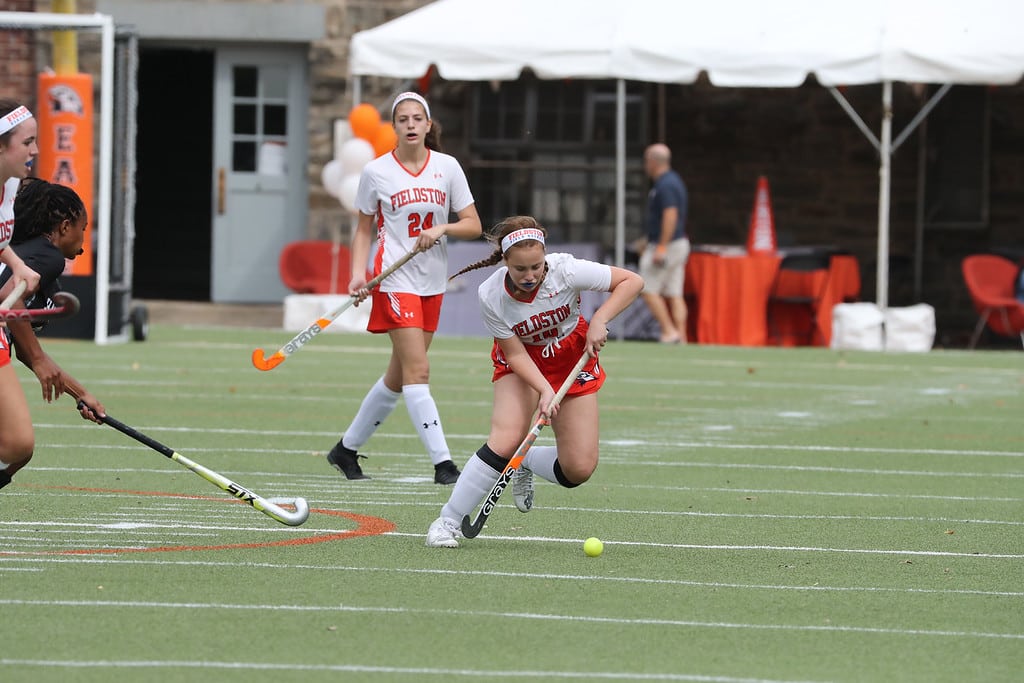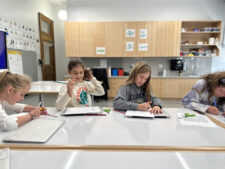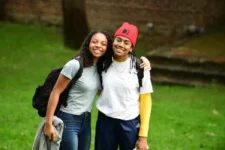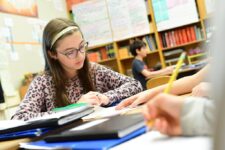Our commitment to progressive education gives our teachers the freedom to tailor their curricula to the needs and curiosity of their students. Faculty support different approaches and alternative learning, staying attentive to student interest that can lead to rich topical explorations. Where our students find inspiration can vary from a recent world event to a shared culture to a new passion — no matter the origin, our teachers are ready to respond.
When one 2nd Grader at Fieldston Lower asked how researchers know about the existence of deep sea creatures, the ensuing talk about underwater exploration led the teacher to take the class on a field trip to Hackensack, New Jersey, to see a former World War II submarine. Back at school, students designed a cardboard submarine that filled half the classroom. The submarine unit has now become a much anticipated part of second grade, covering topics from engineering principles to Handel’s Water Music.
The Meaning of Responsiveness at ECFS
Being responsive allows our faculty and students to keep classwork interesting, but beyond maintaining engagement, it also helps our teachers to make core concepts more understandable. Sometimes it’s a matter of finding ways to relate the lessons of the classroom to aspects of our students’ daily lives. Sensing that their students were finding multiplication tables too abstract, 3rd Grade math teachers took their classes to Whole Foods, where the rows and columns of fruits, vegetables, and cans helped students visualize “4 x 8” and “6 x 7.” Ask your student to do some quick mental math the next time you’re at the grocery store.
And sometimes, being responsive just means listening to what students want to eat for lunch. After a group of 2nd Graders rallied the class to draft a petition to the head chef requesting non-fruit options for dessert, the cafeteria now periodically offers brownies, cookies, and other sweet treats that leave everyone wanting seconds.
While many courses are offered every year, their content may be entirely restructured based on the makeup of the students enrolled. The Fieldston Upper Spanish courses for heritage speakers, for example, take into account the linguistic and cultural variations associated with students’ families’ countries of origin. Each year’s curriculum is driven by student interest: a literature-loving group might read Isabel Allende’s House of the Spirits, Gabriel García Márquez’s A Hundred Years of Solitude, and the Popol Vuh, a Mayan sacred text.
Beyond Our Curriculum: The Alternative Learning Program
This is a sampling of the many innovative courses our faculty teach — but what happens if, after experiencing ECFS’s breadth of classes, students still want to explore something more? In that case, they can create something for themselves. Every two years, Fieldston Upper students, faculty, staff, and administrators choose niche subjects to probe in a two-day experiential learning experience called ALP, or Alternative Learning Program.
Workshops are often student-generated and student-led or co-taught with a faculty member who offers holistic student support and guidance; past topics have included Bollywood and Indian dances, designing Rube Goldberg machines, and the art of roasting and cupping coffee.
A deep interest in a specific area of study leads many of our students to pursue senior projects and independent studies, which can represent the culmination of their personal and academic growth at ECFS. Ranging from art shows to research presentations, these projects are entirely self-directed and illustrate the myriad interests of students at our school. At the end of each academic year, graduating seniors present their work in an exhibition for the entire community to see.
The Result of Responsive Teaching
Learning happens best when students are motivated, when they are supported, and when they can see how their classes relate to their own lives — in short, when education is truly student-focused. In acknowledging the wide range of learning strengths, challenges, and interests that flow through our classrooms, we develop strategies and lesson plans to meet students where they are and give everyone a chance to succeed.



